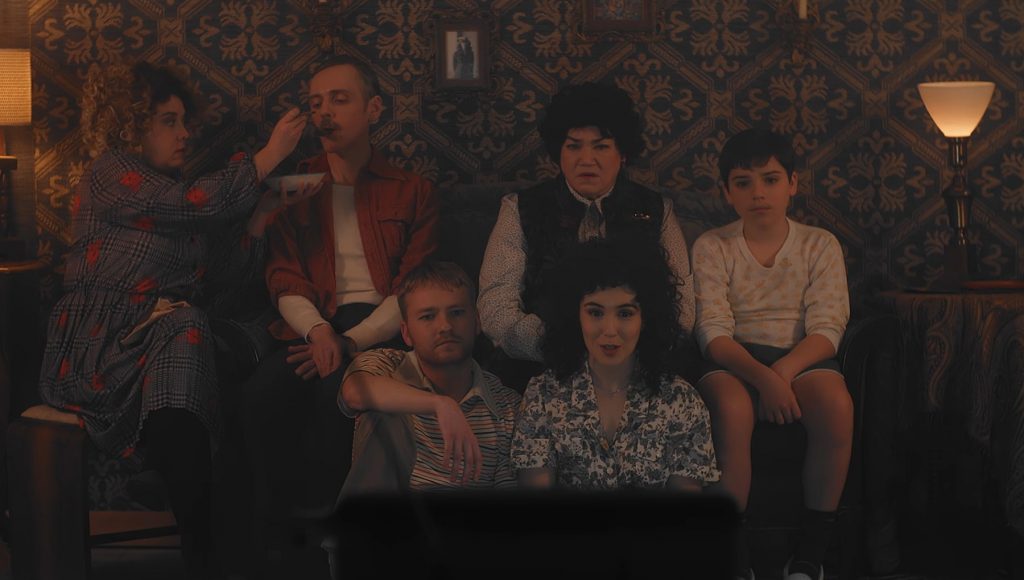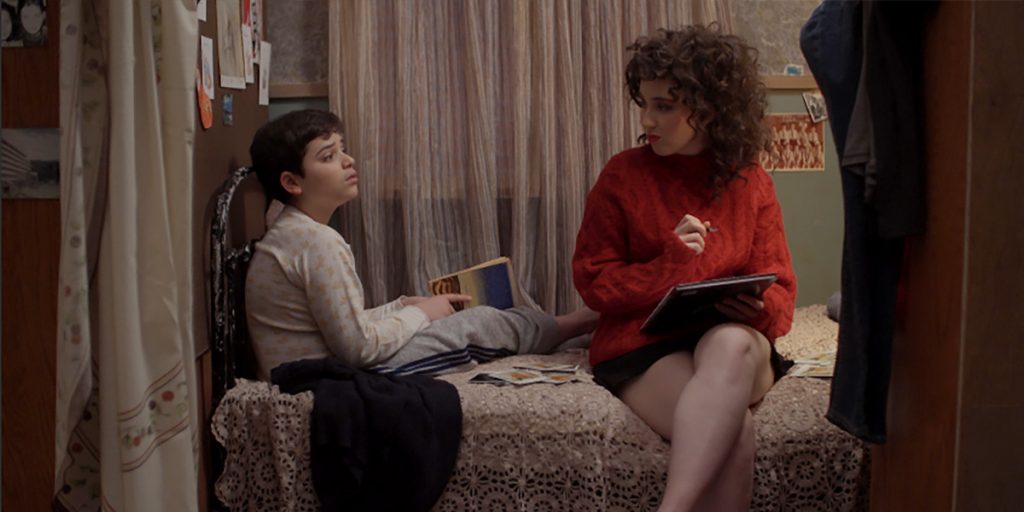Potato Dreams of America efficiently offsets its eccentricity with earnest emotion, sharing a coming-of-age story that is simultaneously silly and stirring.
When someone tells you that the coming-of-age genre is “too crowded,” your response should be, “to who?” While it is true that each new year brings an abundance of additions to this corner of cinema, one must also acknowledge that these films frequently aren’t as diverse as they could – and probably should – be. No one’s upbringing and/or adolescence is identical, and as such, there are a still surplus of stories waiting to be shared across the whole wide world. We have a long way to go before every person feels properly represented onscreen, but thankfully, projects like Potato Dreams of America are breaking down these barriers – and believe me when I tell you that you haven’t ever seen a coming-of-age adventure like this before.
Inspired by writer-director Wes Hurley’s (Waxie Moon in Fallen Jewel) Huffington Post essay “Growing Up Gay in Russia,” Potato Dreams of America’s narrative commences in that country in the late 80s, right as the USSR is collapsing. Here, we meet Hurley’s surrogate, the peculiar “Potato” (Hersh Powers), who lives with his prison doctor mother Lena (Sera Barbieri), constantly battles bullies at school due to his effeminate demeanor, endures tough love from his gabby Grandma Tamara (Lea DeLaria, of Orange is the New Black), and spends his free time talking with an imaginary Jesus Christ (Jonathan Bennett, of Mean Girls). So, to say there’s a lot on Potato’s plate is a bit of an understatement.
Aside from conversing with Christ himself, Potato’s other favorite pastime is ignoring his woes by watching movies – particularly American movies. Given that Potato Dreams of America starts with Quentin Crisp’s quote, “I’ve always been American in my heart, ever since my mother took me to the movies,” it makes sense that an adoration of film would be a foundational part of Potato’s personality, but it also comes to contribute to major life changes for he and his mother, as the leaden Lena grows weary of the wretched displays in her workplace and seeks solace in the stories Potato shows her onscreen, yearning to make a better life for the two of them by slipping away to the States.

After applying to be a mail-order bride and attracting the interest of an American suitor, a teenage Potato (Tyler Bocock) and an older Lena (Marya Sea Kaminski) run from Russia and end up in Seattle in the 90s, staying with the strict – and quite conservative – John (Dan Lauria, of Holidate and The Way Back). In a country free of many of the constraints Potato came across back home, he’s allowed to explore his sexuality more than ever before, but at the same time, he’s scared that his mother may submit to age-old Russian ideologies about the queer community, and he also must be continually cautious about not letting John catch on to his “deviancy.” Will Potato ever be able to live the “American Dream” he’s always longed for?
Aspiring artists often hear the advice, “write what you know,” and though some may see it as a cliché, Potato Dreams of America showcases the sort of singularly shrewd and stirring storytelling that can only arise from a screenwriter baring their soul as they shape their script. Therefore, though it may be a bit of an offbeat odyssey, Potato Dreams of America’s greatest strength is that it’s a tale only Hurley himself could have told, full of curious characters and tantalizing twists that initially feel like fiction until we recall the film’s roots in real-life events. Hurley molds this menagerie of memories into a miraculously moving whole, and even if we don’t see the importance of idiosyncratic encounters at the start of the story, every scene plays a prominent role in making Potato’s resolution appear as resonant as it does, creating an exceptionally entertaining experience in the end.
Themes of Russian oppression and LGBTQ+ persecution aren’t perhaps investigated as intensely as some may desire, but the presence of this insidiousness is quite palpable nonetheless, and Hurley uses this backdrop of exterior brutality to add complexity to his ensemble cast, who are always at the front of his filmmaking first and foremost. He demonstrates a deft ability to mine even the most minor of moments for their meaningfulness through his dexterous dialogue, and he’s equally efficient at balancing his narrative’s eccentricity with its earnest emotionality. The central story of Potato Dreams of America may be simple on its surface, but it’s the specificity in these scenes – whether between Potato and Lena, Potato and Grandma Tamara, or Potato and Jesus Christ – that ensure our engagement to Hurley’s intimate decade-spanning epic.
Speaking of the compelling cast Hurley has assembled here, it’s instantly apparent that these actors are the not-so-secret weapon to Potato Dreams of America’s success overall. Hurley’s experiences are enticing on their own for sure, but without thespians who can appropriately walk this script’s tonal tightrope, Potato could very well crumble completely – and luckily, that’s not the case. To start, both the younger (Powers) and older (Bocock) incarnations of Potato proficiently depict his personality at two distinct periods in his life – with Powers emphasizing his endearing doe-eyed innocence in youth and Bocock personifying his persistent panic over his awareness of his sexual “abnormality” in adolescence – and their portrayals fit together tenderly instead of feeling at odds with one another. Potato’s character arc wouldn’t be near as affecting if both Powers and Bocock didn’t properly pull their weight, but the two are truly terrific the whole way through.
Likewise, each actor is surrounded by stellar supporting scene partners to play off as well, and there isn’t a weak link to be found. Of the two Lenas, Kaminski makes a bigger impression simply due to her screen time and the nature of her anecdote in America, charmingly conveying wittiness and warmth in the latter half of the film, but Barbieri is still a lovable lead, particularly given her captivating commitment to Potato. DeLaria’s Grandma Tamara is gifted with some of the standout lines in the script – which she devilishly delivers – while Bennett’s Jesus Christ is an absurd amusement (and his rapport with Potato feels very reminiscent of the central relationship Jojo Rabbit in all the best ways). Lastly, while it first looks like Lauria’s John is a stereotypical “strict stepdad,” his subplot is perhaps the most poignant of all, and Lauria treats the surprises of this storyline with striking sincerity.
While you may have seen countless coming-of-age flicks in years past, you’ve never seen one about a queer Russian kid obsessed with American movies and Jesus Christ who migrates to the United States with his mail-order bride mother in search of a better life, and Potato Dreams of America is here to cure that cinematic blindspot for you. Whether this aberrant adventure is for all audiences remains to be seen, but regardless, it’s worth giving Potato a watch simply to witness the skillfully silly and sweet storytelling sensibilities of writer-director Wes Hurley, an artist with originality like none other.
Potato Dreams of America had its World Premiere at SXSW Online on March 16, 2021 in the 2020 Spotlight Section of the festival.

